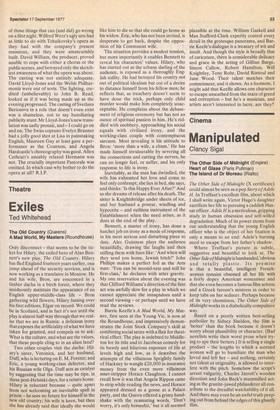Theatre
Exiles
Ted Whitehead
The Old Country (Queens) A Mad World, My Masters (Roundhouse) Only disconnect — that seems to be the ticket for Hilary, the exiled hero of Alan Bennett's new play, The Old Country. Hilary has fled England fourteen years earlier, one jump ahead of the security services, and is now working as a translator in Moscow. He and his wife, Bron, are ensconced in a timber dacha in a birch forest, where they assiduously maintain the appearance of an English upper-middle-class life — Bron gathering wild flowers, Hilary fussing over his first editions, Elgar on record. We could be in Scotland, and in fact it's not until the play is almost half-way through that we realise that we are in Russia: a delicious irony that exposes the artificiality of what we have taken for granted, and compels us to ask: What is the culture, and what are the values, that these people cling to in an alien land?
Two other couples visit the dacha: Hilary's sister, Veronica, and her husband, Duff, who is lecturing on E. M. Forster; and Eric, a young working-class defector, and his Russian wife Olga. Duff acts as catalyst by suggesting that the time may be ripe, in these post-Helsinki days, for a return home. Hilary is reluctant because — quite apart from not welcoming an inevitable spell in prison — he sees no future for himself in the new old country; his wife is keen, but then she has already said that ideally she would like him to die so that she could go home as his widow. Eric, who has not been invited, is desperate to get back, despite the opposition of his Communist wife.
The situation provides a modest tension, but more importantly it enables Bennett to reveal his characters' values. Hilary, who has started out as the urbane darling of the audience, is exposed as a thoroughly English nullity. He had betrayed his country not out of political idealism but out of a desire to distance himself from his fellow men; he reflects that, as treachery doesn't seem to have done the trick, perhaps only child murder would make him completely unacceptable. He complains about the debasement of religious ceremony but has not an ounce of spiritual passion in him. He's riddled with snobbery, approaching his social equals with civilised irony, and the working-class couple with contemptuous sarcasm. Most revealing is his attitude to Bron: 'more than a wife, a chum.' He has made himself invulnerable by severing all the connections and cutting the nerves; he can no longer feel, or suffer, and his only response to life is irony.
Inevitably, as the man has dwindled, the wife has exhausted her love and come to feel only contempt; she lies in bed, she says, and thinks: 'Is this Happy Ever After?' And so she.dreams of release after his death. The sister is Knightsbridge under sheets of ice, and her husband a poseur, windbag and hypocrite — and ruthless instrument of the Establishment when the need arises, as it does at the end of the play.
Bennett, a master of irony, has done a hatchet job on irony as a mode of response, in his most serious and disturbing piece to date. Alec Guinness plays the audience beautifully, drawing the laughs and then stifling them with lines like: 'And when will they send you home, Jewish bitch?' John Phillips makes a perfect foil as the Arts man: 'You can be second-rate and still be first-class,' he declares with utter gravity. My one reservation about the evening was that Clifford Williams's direction of the first act was awfully slow for a play in which we cannot appreciate the innupdoes until a second viewing — or perhaps until we have read the reviews.
Barrie Keeffe's A Mad World, My Masters, first seen at the Young Vic, is now at the Roundhouse, and impressively demonstrates the Joint Stock Company's skill at combining social satire with a flair for theatrical effect. The play is indebted to Middleton for its title and tO Jacobean comedy for its bawdy and hilarious exposure of life at levels high and low, as it describes the attempts of the villainous Sprightly family of Hackney to wangle £20,000 in insurance money from the even more villainous asset-stripper Horace Claughton. I cannot recall how it was that Angela Rippon came to strip while reading the news, and Horace appeared dressed as a goose at a Palace party, and the Queen offered a grimy handshake with the reassuring words, 'Don't worry, it's only horseshit,' but it all seemed plausible at the time. William Gaskell and Max Stafford-Clark expertly control every detail in the grotesque panorama, and Barrie Keefe's dialogue is a treasury of wit and insult. And though the style is broadly that of caricature, there is considerable delicacy and grace in the acting of Gillian Barge, Simon Callow, Robert Hamilton, Will Knightley, Tony Rohr, David Rintoul and Jane Wood. Their talent matches their commitment, and it shows. As a footnote, I might add that Keeffe allows one character to escape unscathed from the maze of greed and corruption — but he's a musician, and artists aren't interested in lucre, are they?






























 Previous page
Previous page